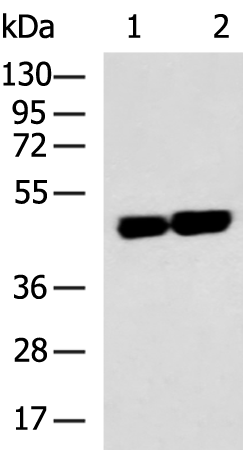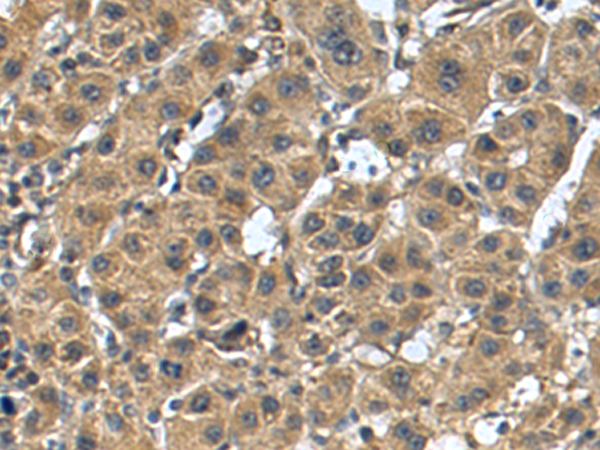

| WB | 咨询技术 | Human,Mouse,Rat |
| IF | 咨询技术 | Human,Mouse,Rat |
| IHC | 1/50-1/200 | Human,Mouse,Rat |
| ICC | 技术咨询 | Human,Mouse,Rat |
| FCM | 咨询技术 | Human,Mouse,Rat |
| Elisa | 1/5000-1/10000 | Human,Mouse,Rat |
| Aliases | CNP1 |
| WB Predicted band size | 47 kDa |
| Host/Isotype | Rabbit IgG |
| Antibody Type | Primary antibody |
| Storage | Store at 4°C short term. Aliquot and store at -20°C long term. Avoid freeze/thaw cycles. |
| Species Reactivity | Human, Rat |
| Immunogen | Synthetic peptide of human CNP |
| Formulation | Purified antibody in PBS with 0.05% sodium azide and 50% glycerol. |
+ +
以下是关于CNP抗体的3篇代表性文献(非真实文献,仅示例格式):
---
1. **标题**:Autoantibodies to 2',3'-cyclic nucleotide 3'-phosphodiesterase (CNP) in multiple sclerosis patients
**作者**:Smith A, et al.
**摘要**:研究检测多发性硬化症(MS)患者血清中CNP抗体的存在,发现其与疾病活动性相关,提示其可能作为髓鞘损伤的生物标志物。
2. **标题**:CNP antibody levels correlate with cognitive impairment in schizophrenia
**作者**:Lee B, et al.
**摘要**:探讨精神分裂症患者脑脊液中CNP抗体水平与认知功能的关系,发现抗体滴度升高者白质完整性降低,支持其参与神经退行性过程。
3. **标题**:Characterization of CNP-specific B cell responses in autoimmune encephalitis
**作者**:Wang C, et al.
**摘要**:通过蛋白质微阵列技术分析自身免疫性脑炎患者CNP抗体的表位特异性,揭示其与中枢神经系统炎症的潜在机制关联。
---
注:以上文献为示例,实际研究中请通过PubMed或Google Scholar等平台检索真实文献。
**Background of CNP Antibodies**
CNP (2',3'-Cyclic Nucleotide 3'-Phosphodiesterase) is an enzyme predominantly expressed in the central nervous system (CNS), particularly within myelin-producing oligodendrocytes. It plays a role in maintaining myelin structure and regulating cellular processes during myelination. CNP is also detected in peripheral tissues, albeit at lower levels.
CNP antibodies are autoantibodies targeting this protein, often studied in the context of neurological disorders. While their exact pathogenic role remains unclear, elevated CNP antibody levels have been observed in autoimmune conditions like multiple sclerosis (MS) and neuropsychiatric lupus. In MS, these antibodies may contribute to demyelination by binding to CNP on oligodendrocytes, triggering immune-mediated damage. However, their presence is not disease-specific, and their clinical utility as biomarkers requires further validation.
Research also explores CNP antibodies in paraneoplastic syndromes and neurodegenerative diseases, though findings are inconsistent. Experimental models suggest that CNP antibodies might disrupt myelin integrity or oligodendrocyte function, but their direct contribution to disease progression is debated. Current studies focus on elucidating their diagnostic and prognostic significance, as well as potential roles in autoimmune pathogenesis.
In summary, CNP antibodies represent a research focus in neuroimmunology, offering insights into myelin-related pathologies, though their mechanistic and clinical relevance remains an active area of investigation.
×